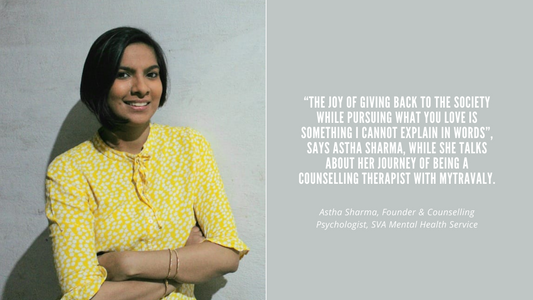A journey of self-believe is how Astha Sharma's story can be defined
 09 Apr, 2021
13 mins read
65
09 Apr, 2021
13 mins read
65

"The joy of giving back to the society while pursuing what you love is something I cannot explain in words", says Astha Sharma, while she talks about her journey of being a therapist with MyTravaly.
Astha Sharma is a counselling psychologist and an entrepreneur who chose her career at an early age so she could serve people. Her approach towards Gestalt psychology makes her stand different. She believes in providing the best for her client and never fails to generate a sense of peace in everyone’s mind. She was always keen to do Social Work; she turned this habit into a career and is now serving mental health problems to people.
She is a woman with surplus experience as an entrepreneur and so, MyTravaly interviewed her to get insights into her personal and professional life, her journey, and her advice that she wants to give to the budding mental health professionals. We also spoke to her about her difficulties as in India people still don’t take Mental Health problems seriously.
1. How did you decide to become a therapist?
Being a therapist was something I'd been looking forward to from a very young age. I was around 13 years, when I was introduced to the concept of studying human behaviour, i.e. Psychology and I was immediately fascinated by the subject. After having browsed enough about it, I realised that I know people with severe mental health conditions - both in my family as well as among friends. I wanted to know if I can help them cure - and the answer was yes. Even though I was selected in various colleges for pure science courses, I decided to pursue Psychology after 10th. At the age of 16, I attended my first client, a simple case history intake for a rescued girl in a government shelter home. During the session, I realised she might have bipolar disorder and helped her reunite with her family and I also decided to conduct free psychiatric and psychological consultation for her so that she could begin the treatment. I've never looked back since then. The joy of giving back to the society while pursuing what you love is something I cannot explain in words!
2. Does attending to your clients affect your mental health? If yes, how do you deal with it?
I've often heard people say, “How can you have anxiety/ depression or any other mental health condition. You are a therapist!" We are robbed of being human at the end. But let me tell you, a chef gets hungry, a doctor falls sick, and a travel agent also goes on a vacation!
When a person constantly processes someone else's negative emotions, it can take a toll on them as well no matter if they are mental health professionals. The secret is that every therapist has a therapist. This allows us to be human. I am in constant touch with my supervisor, despite having a practice of my own, and she is in touch with her supervisor, and so on.
3. What do you do to maintain a healthy, well-balanced life?
I make it a point to leave my work on my desk when I head to home. As an entrepreneur it's not entirely possible, a lot of background work and hustle goes into the presentation of something as simple as one Instagram post, but I take a break from seeing clients after my working hours. Besides, I try to maintain a healthy lifestyle, following a strict diet and a sleeping schedule, going on regular walks. I indulging myself in doing the things I love, like painting, reading, exploring the city, and spending time with friends and family.
4. What kind of therapy do you offer and how does it work?
I have an eclectic approach to therapy, though my core principles lie in the Gestalt School of thought. The main focus of therapy sessions with me is on what's happening 'here and now, living in the moment, and dealing with how the thoughts of the past or worries of the future affect the presence of an individual. I offer these services to individuals, couples, as well as families since I have specialized in Relationship and Family Therapy, alongside Chemical De-Addiction & Rehabilitation Counselling, and Organization/Workplace Psychology. All the services are available online via phone, chat, & email, as well as in-person for clients situated in Bangalore City.
5. How do you help your clients open up?
It can be difficult being vulnerable in front of a complete stranger, so I spend a lot of my time to know my clients. Knowing about their school/career, their culture, their city, their likes & dislikes (not necessarily pertaining to therapy), and their previous experience with mental health professionals, if any, makes the client comfortable. I ask them about their family and friends, the type of bond they share with them, and most importantly the reason why they are in my office. When you hear people, they are at ease and feel more comfortable with every passing session. This eventually makes them share every single detail over the session about their problems.
6. What would you consider to be the leading cause of mental health issues today?
Mental health concerns can arise due to various reasons, including genetic predispositions, trauma, lifestyle, unresolved childhood issues, interpersonal conflicts, etc. Pandemic is definitely a concern. But above all, the leading cause of mental health concern, according to me, is the stigma attached to mental health.
People's unwillingness to address mental health concerns often translates to what we call 'generational trauma'. A parent with anxiety, for example, who doesn't receive help often unloads their emotional turmoil onto the child in the form of constant boundary violations, or by being too controlling - which in turn affects the child's mental health causing their confidence to drop and developing low self-esteem. So unless someone steps out of this cycle of passing on mental health conditions from one generation to the next by breaking the silence and actively seeking mental health support, you can expect the numbers to stay stable, if not rise.
7. In India where talking about mental health is still taboo, how do you convey to people that it’s as important as your physical health; that visiting a mental health professional doesn't make you crazy?
That is exactly what I tell them. Mental health is as important as your physical health. If you are taking care of your body, why not take care of your mind? As for the 'being or not being crazy' aspect, I try to focus the attention of my clients as well as potential clients to the fact that availing mental health services does not make you a mental health patient. Just as taking a blood test doesn't cause you to have high blood sugar - you already had high blood sugar before you came to see the doctor. You do not develop a mental health condition just because you are visiting a mental health professional. We deal with a lot more than clinical cases, we deal with relationship conflicts, stress, and career-related concerns, as well as lifestyle changes and in some cases nutrition. It is important to identify that all of these concerns affect your mental health and you don't necessarily need to have a clinical diagnosis in order to see a professional. Labeling people as crazy or ‘pagal’ deters them from seeking help - it needs to stop.
8. As an entrepreneur, how do you reach your clients amid the pandemic?
I have my clients in Bangalore, where our office is situated and other clients from different parts of India and other countries too. Staying connected with my clients is not a very difficult task because we have been offering our services online from day one. To stay in constant touch with them, we regularly update our Instagram and Facebook pages which have content related to mental health and psychosocial education or awareness.
9. What would you tell youngsters who are aspiring to be mental health professionals?
Depending on the kind of mental health professional you want to be, ensuring that you are properly qualified and registered with the relevant bodies, is a must. A weekend workshop doesn't qualify you as mental health professional or practice as one. The career path that you have chosen is a demanding one, and I wish you all the best, hoping that you will put yourself first and address your mental health concerns before reaching out to help your clients.
10. How do you cope when you're not mentally stable and there is a patient knocking at your door?
I don't. I can never do injustice to myself, my clients, or my career as a mental health professional. I do not take care of my mental health before addressing the needs of my clients. I take a day off, I take a break, I reschedule. I go back to my clients when I'm ready to process again.
11. How can travel help one cope with their mental health conditions? Do you recommend travelling to your clients?
Travel can definitely help some people cope up with minor mental health concerns like stress or burnout. I recommend my clients that they take regular breaks, but travel is something I personally would not prescribe, simply because I'm aware that there can be clients who have mental health concerns pertaining to travel in particular. For example, I am currently seeing a client who has travel anxiety so severe that they scheduled an appointment to match the time they'd be travelling. I need to identify the needs of my clients before I suggest travel as a remedy.
Written By:



Hotels at your convenience
Now choose your stay according to your preference. From finding a place for your dream destination or a mere weekend getaway to business accommodations or brief stay, we have got you covered. Explore hotels as per your mood.


